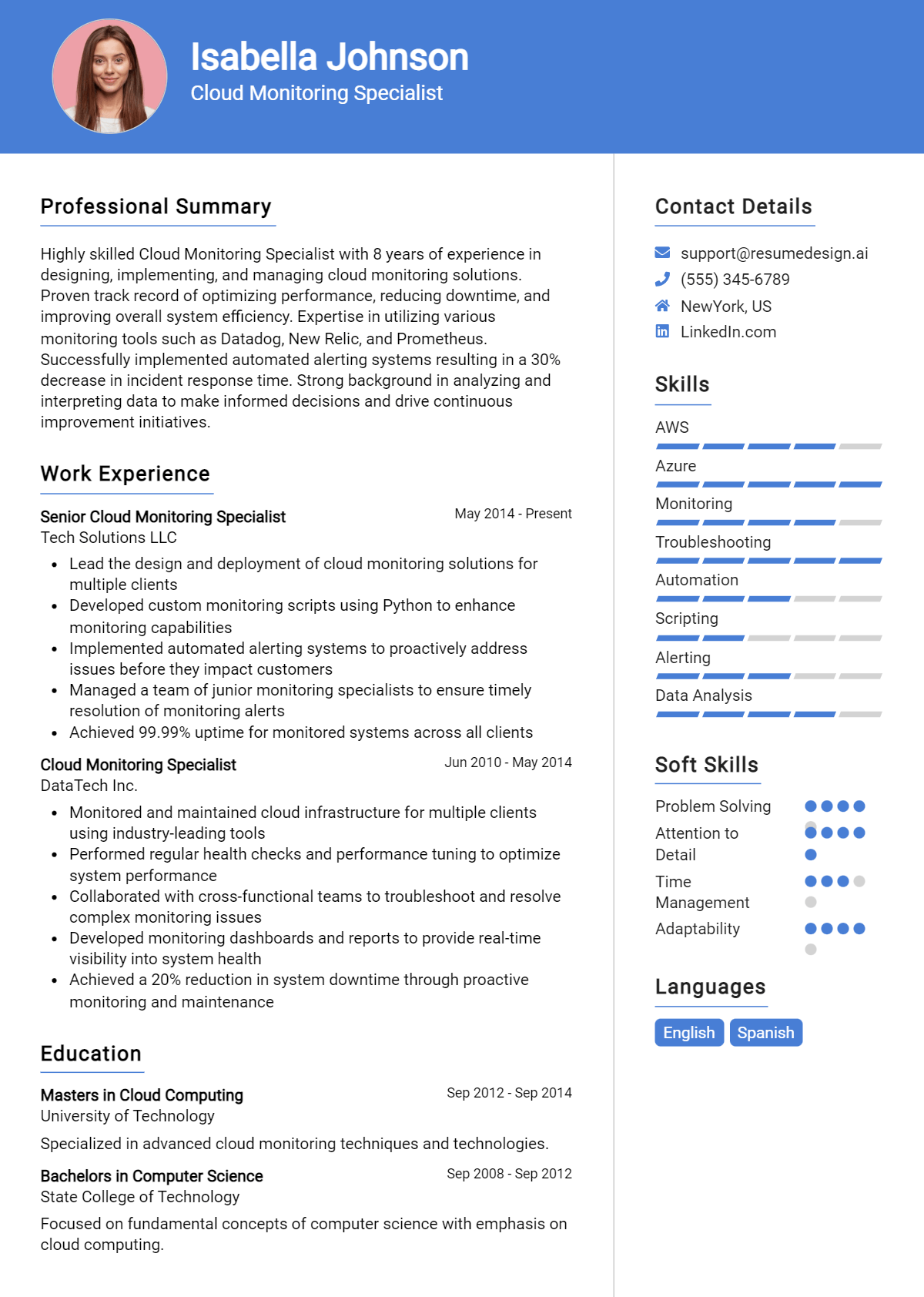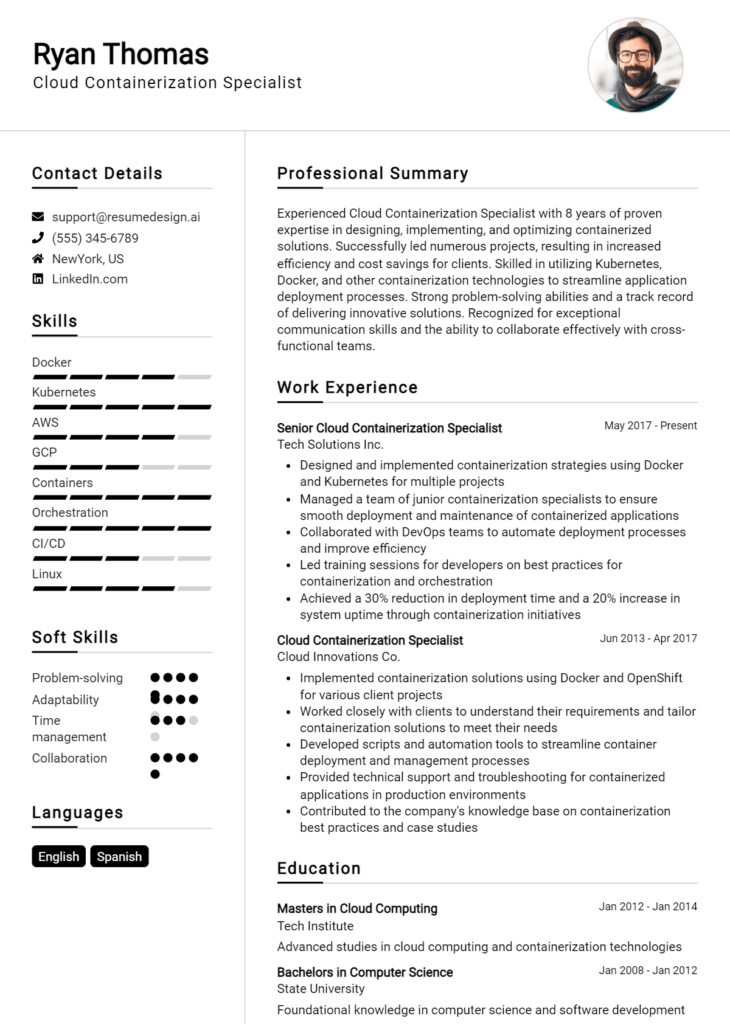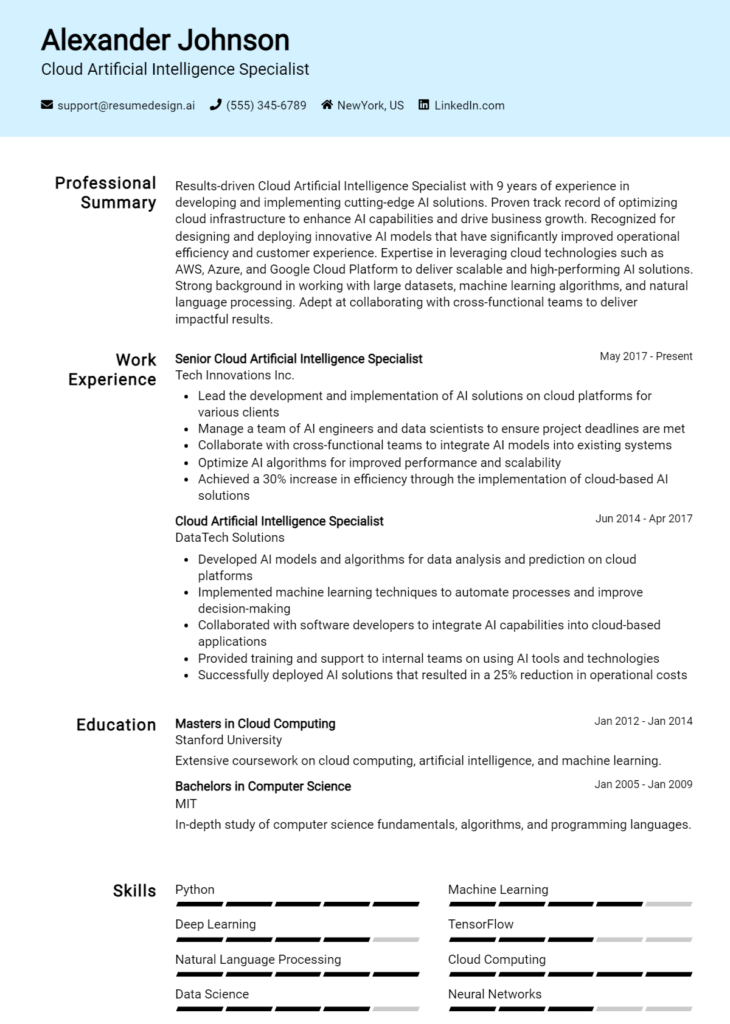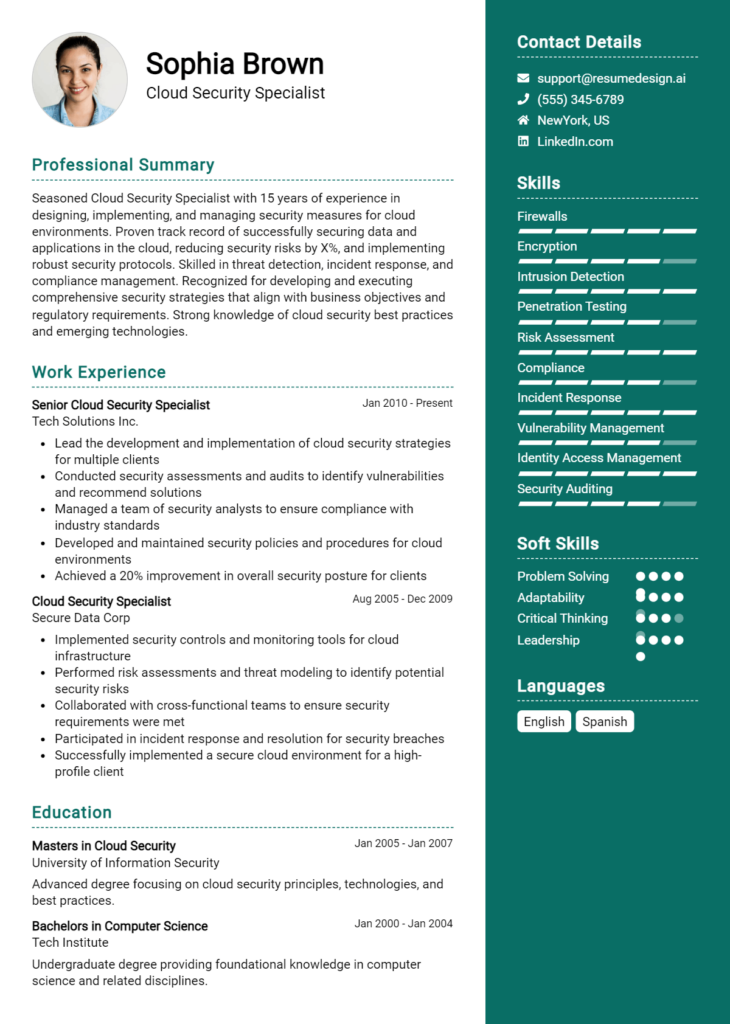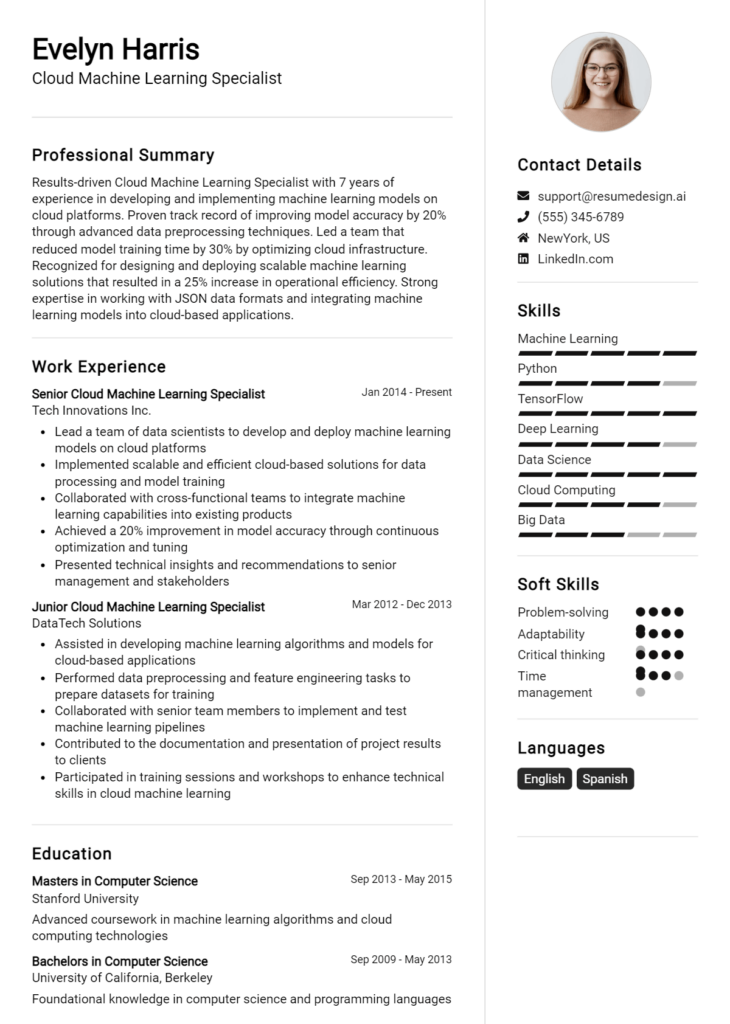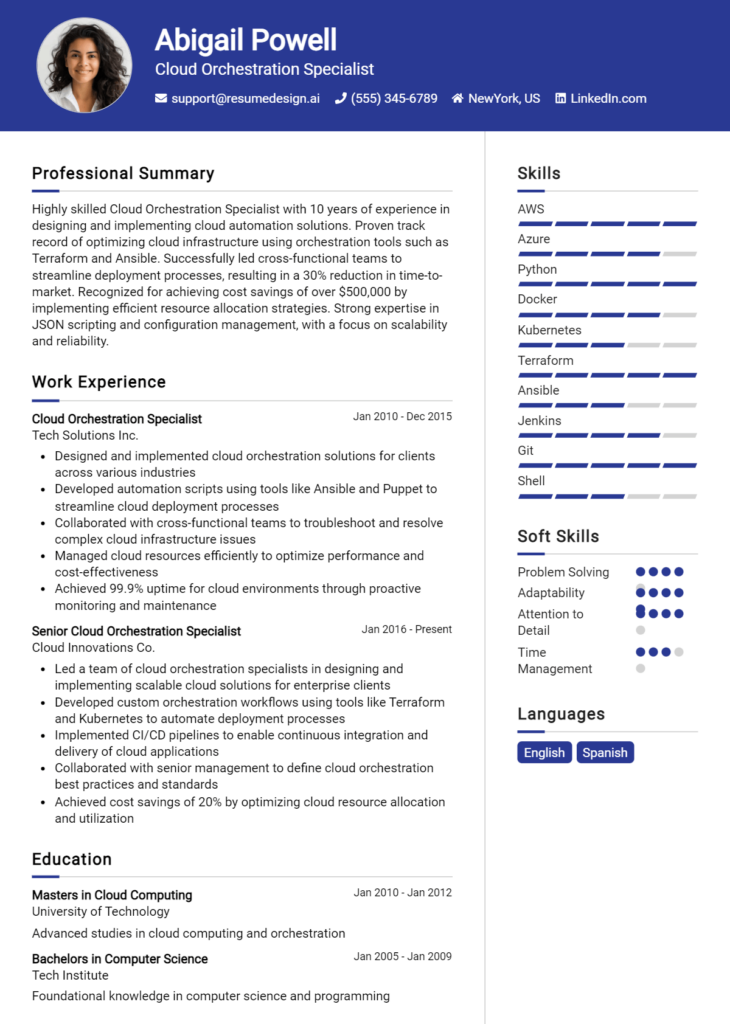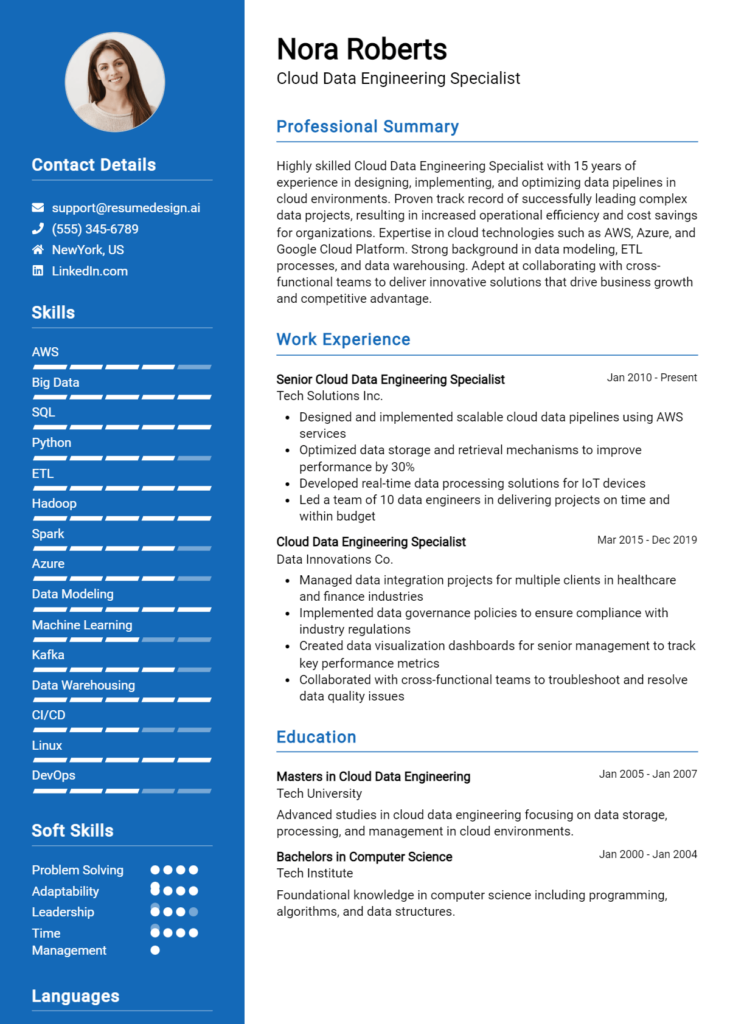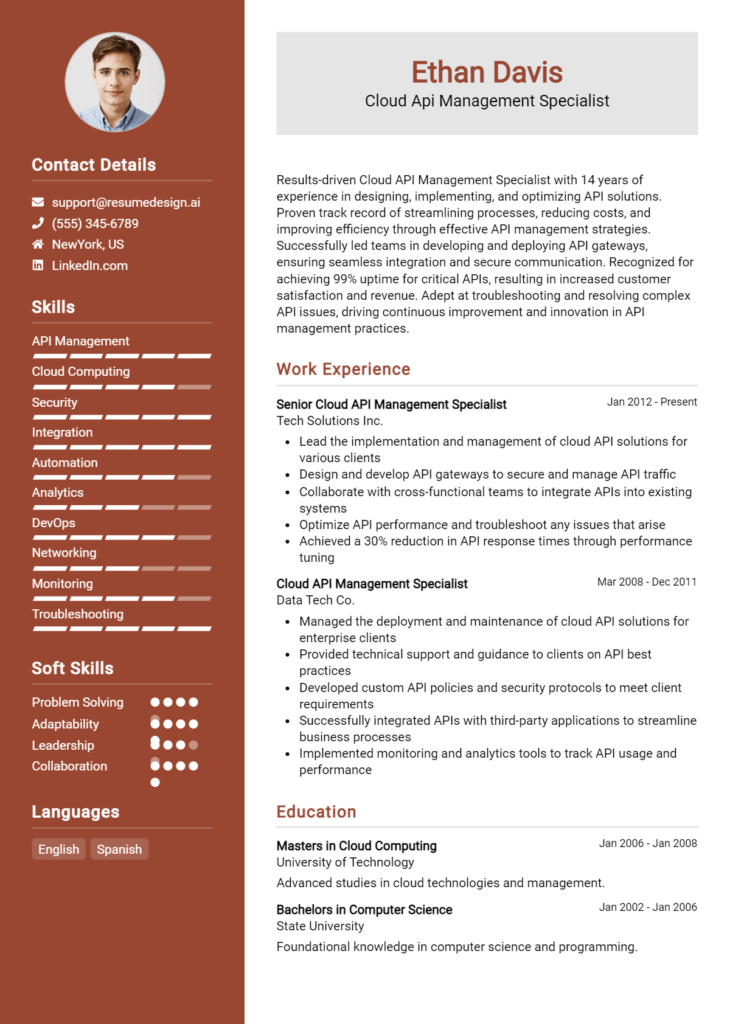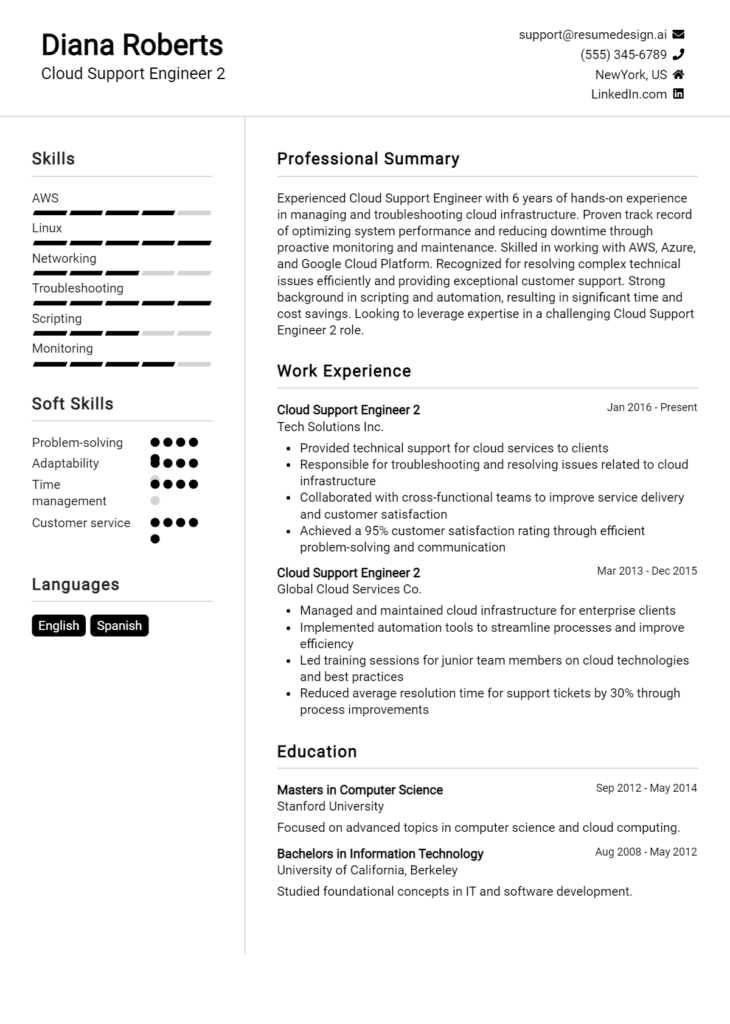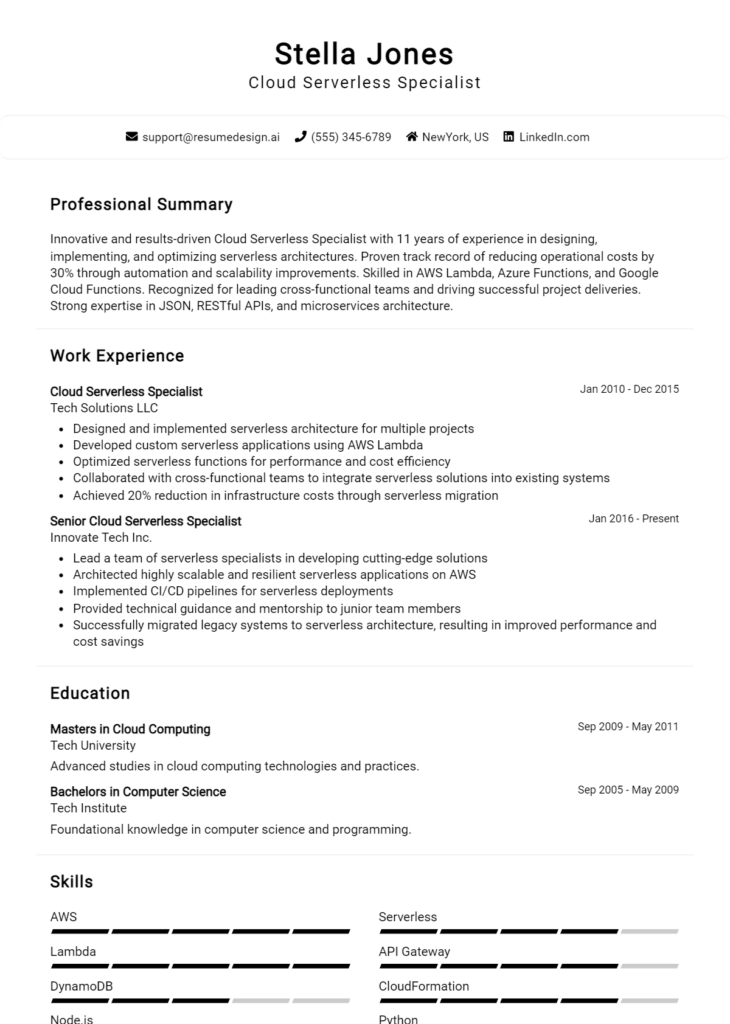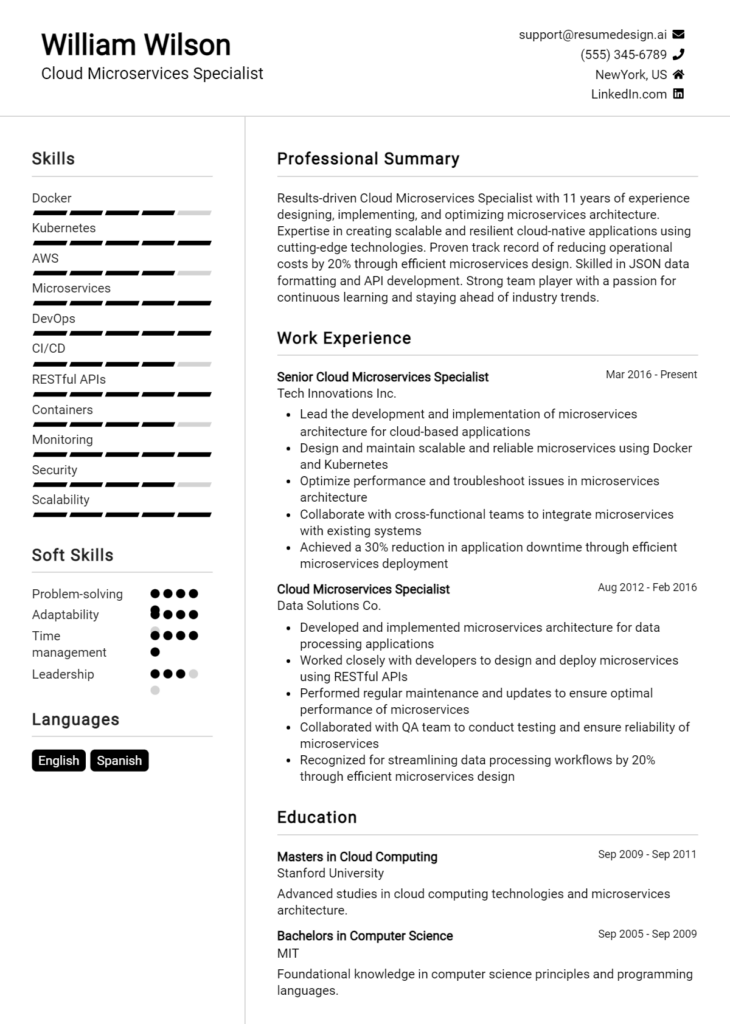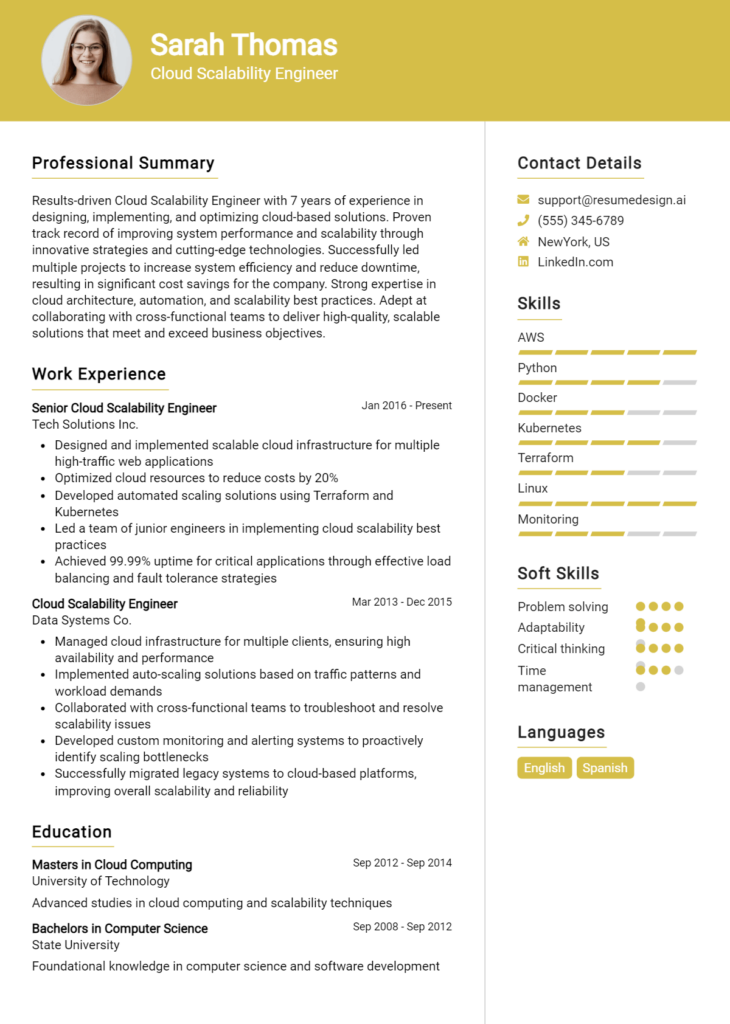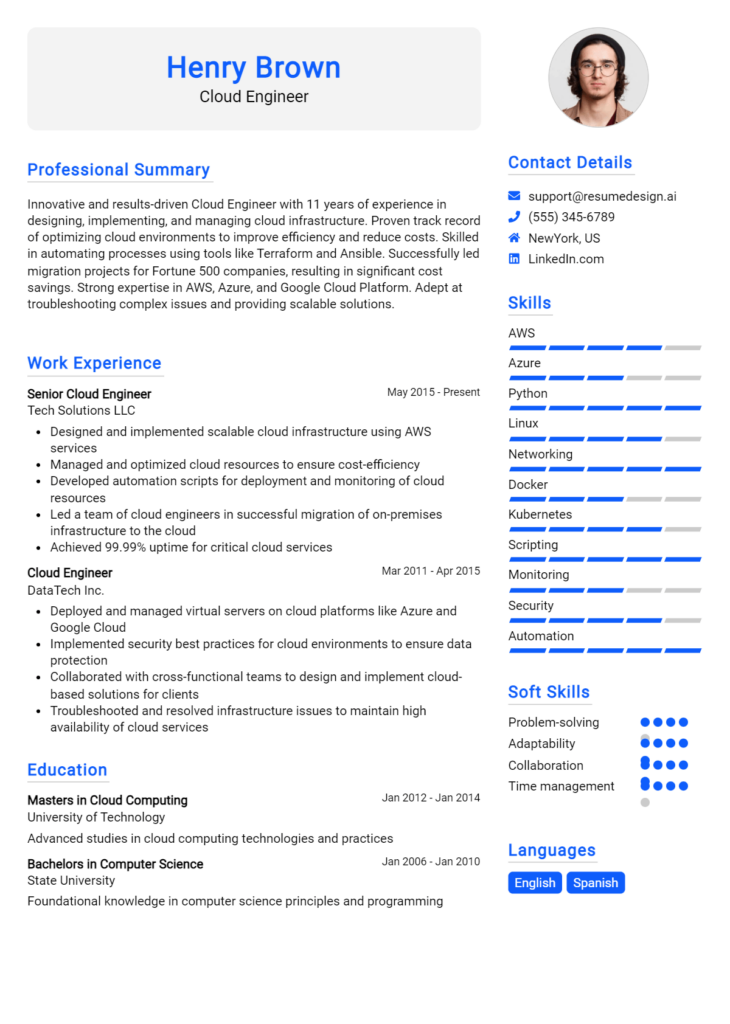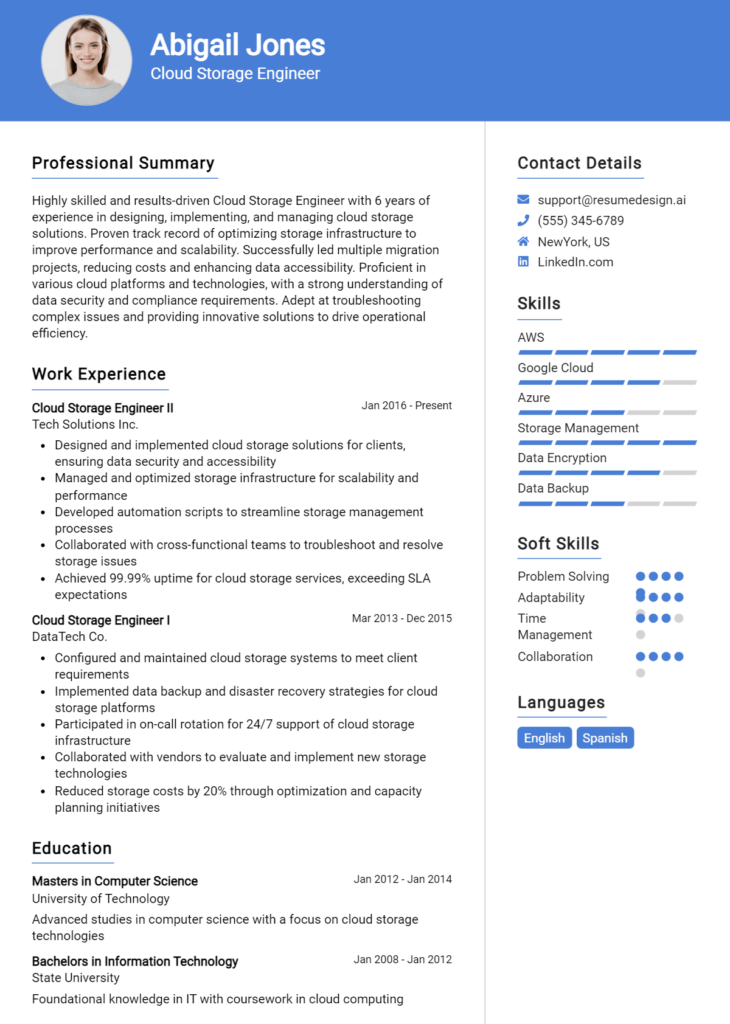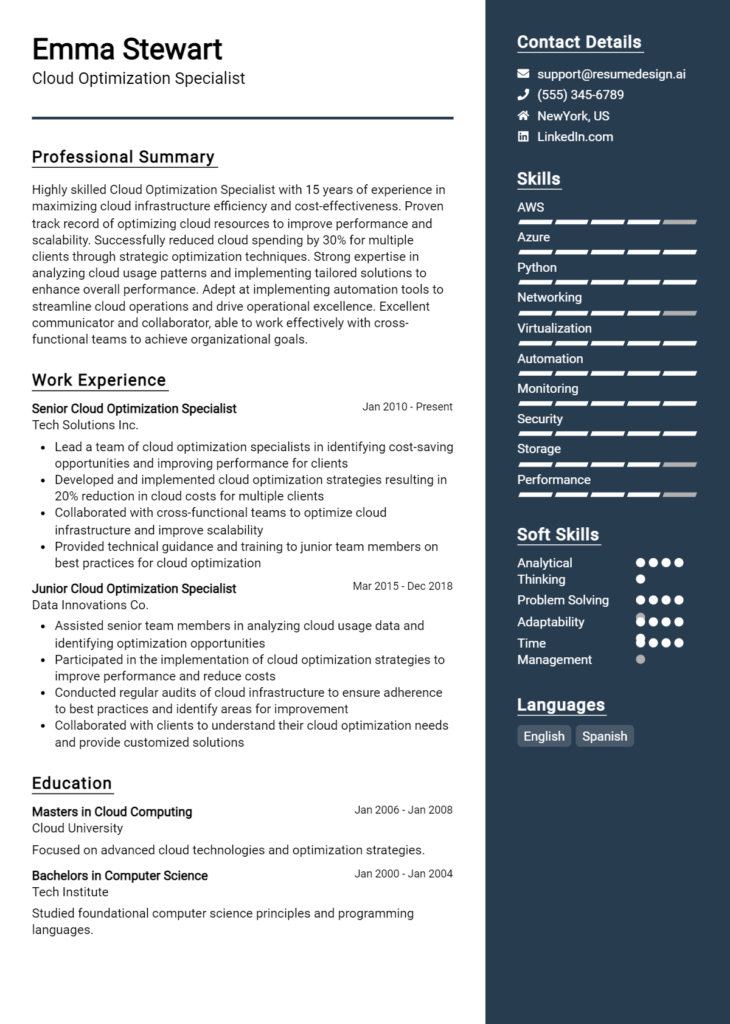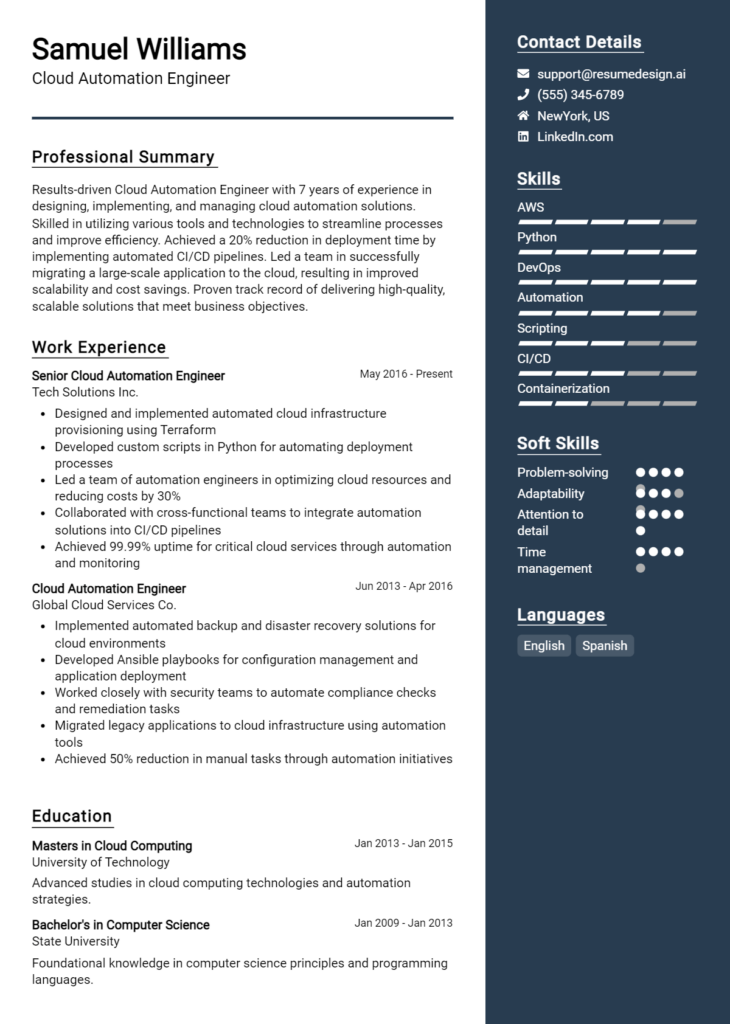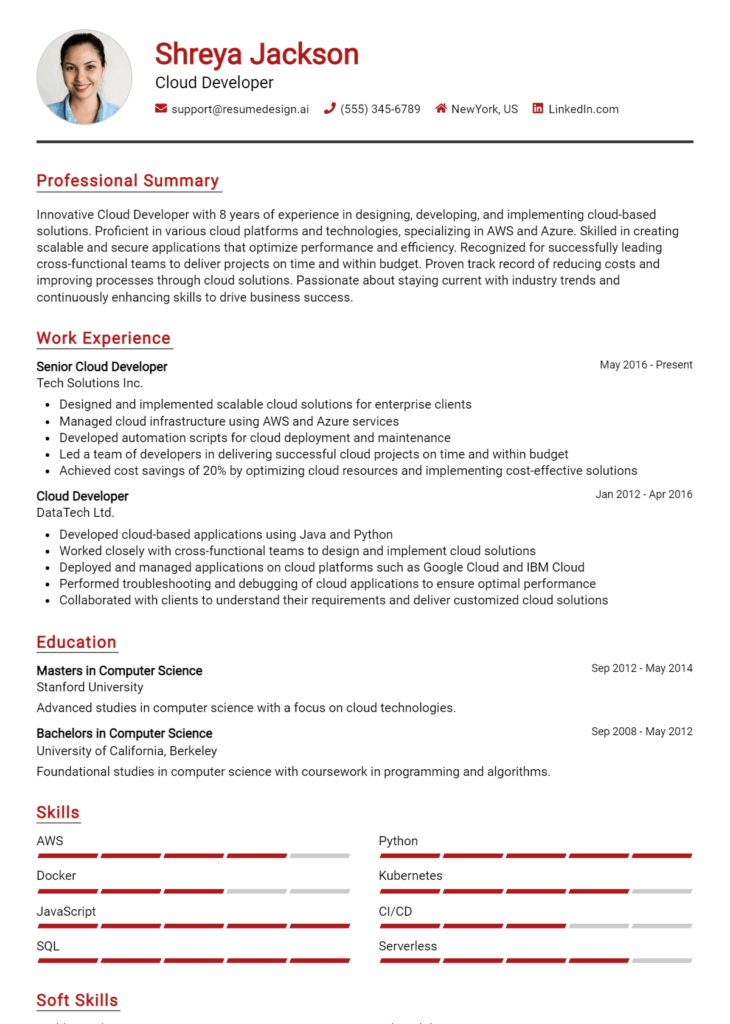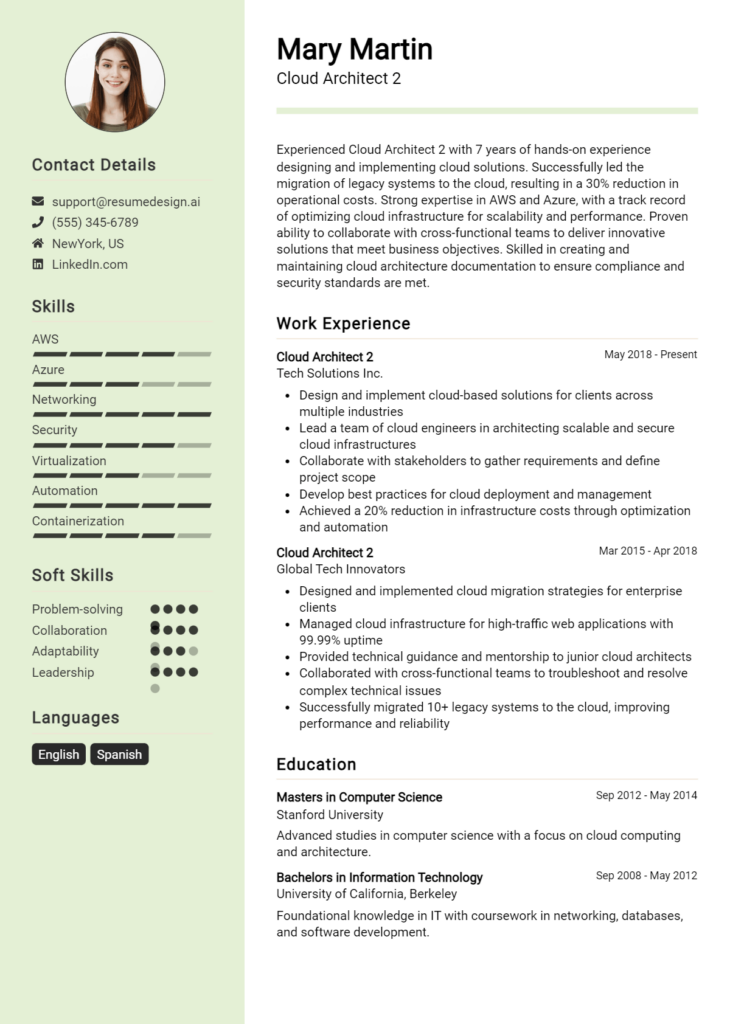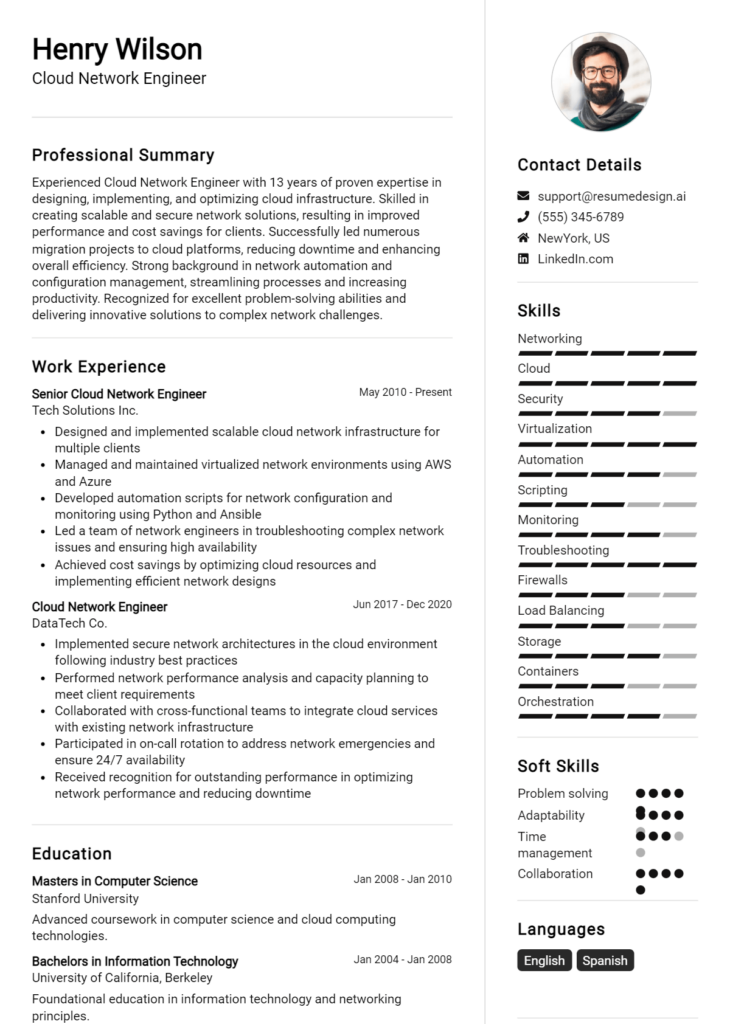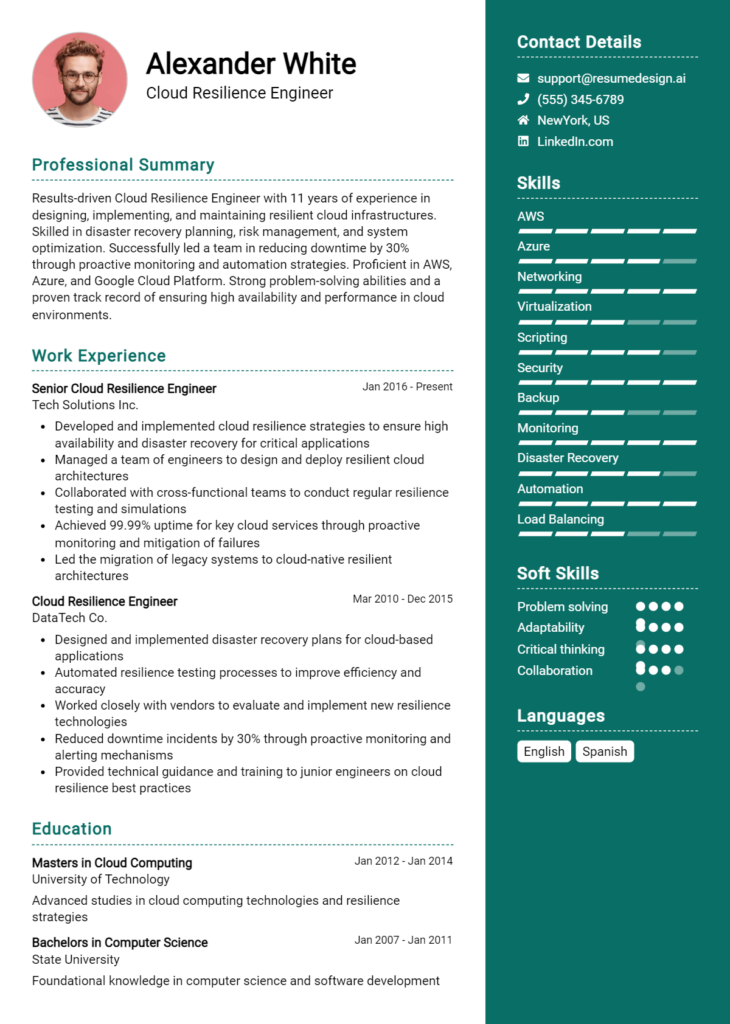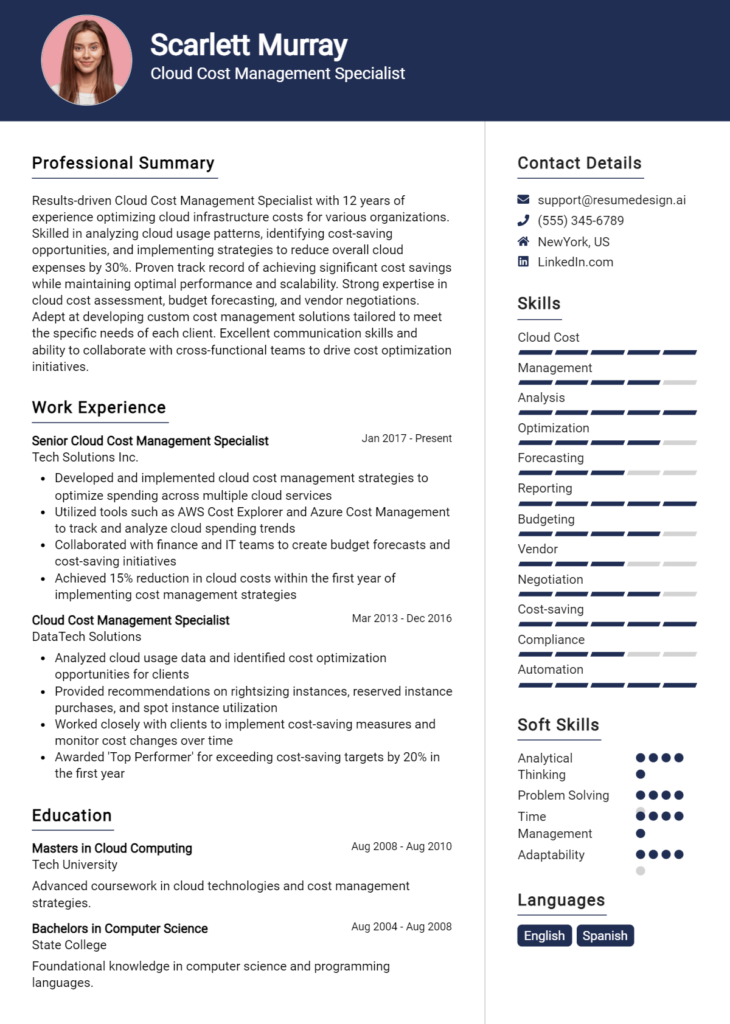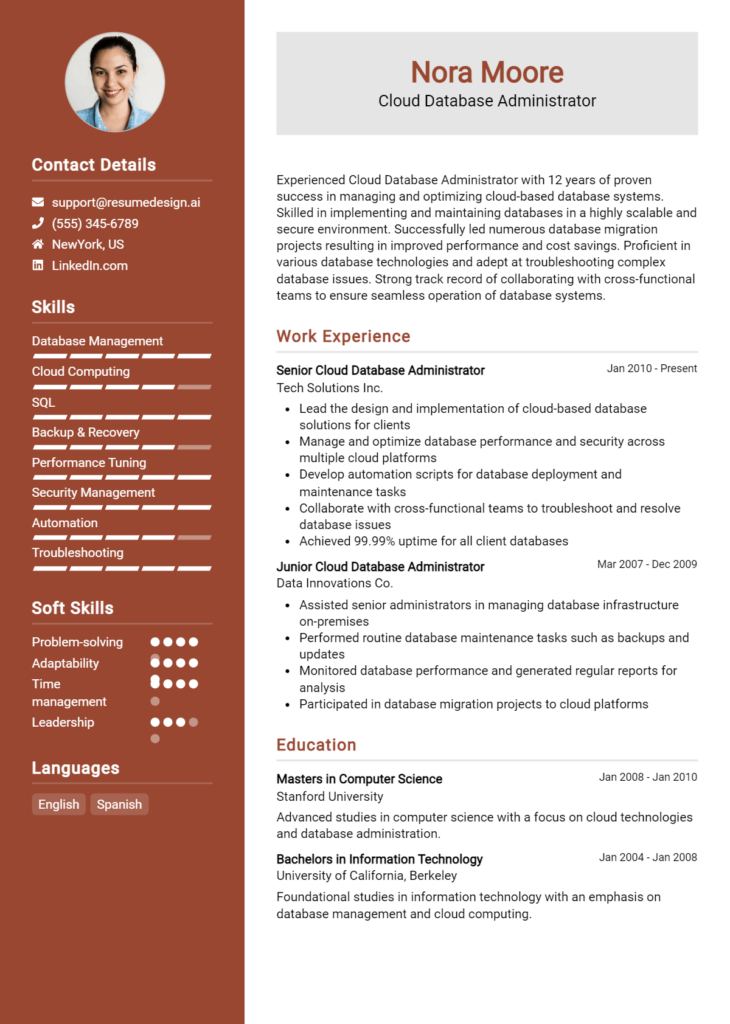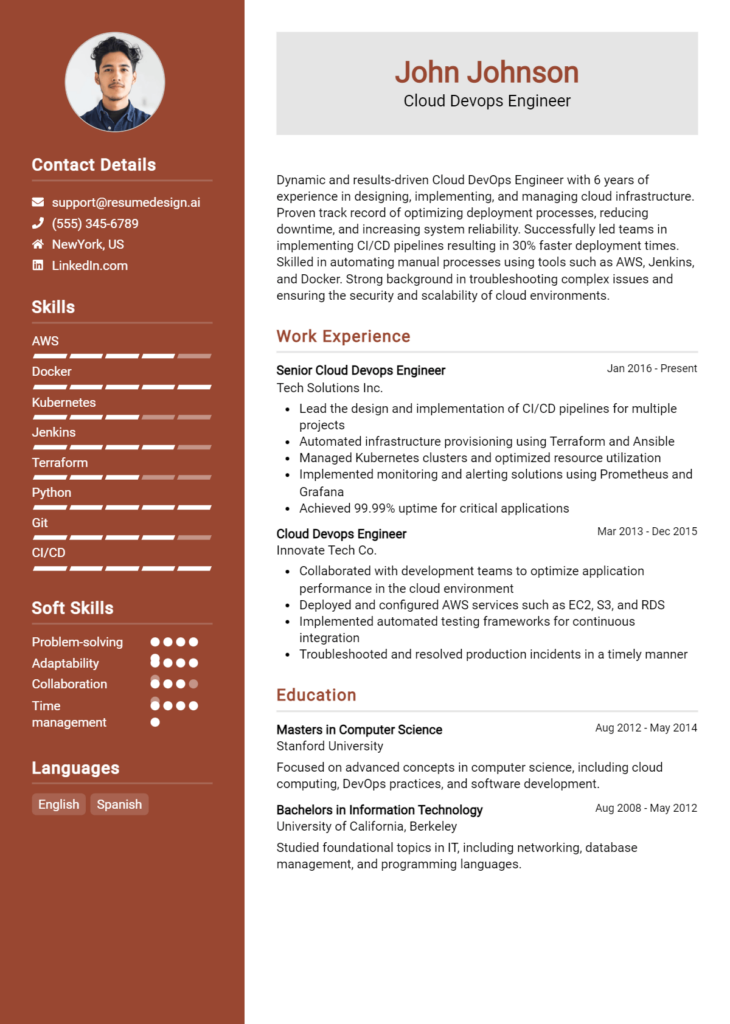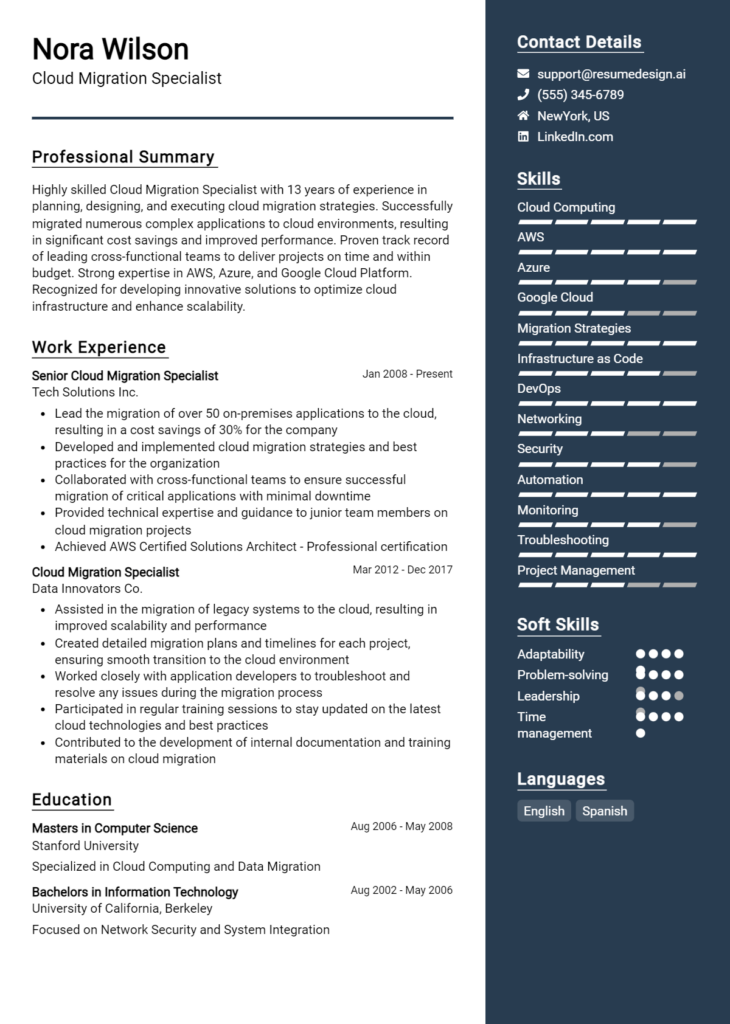Cloud Monitoring Specialist Core Responsibilities
A Cloud Monitoring Specialist plays a critical role in ensuring the optimal performance and reliability of cloud-based systems. This professional is responsible for monitoring cloud infrastructure, identifying anomalies, and implementing proactive solutions to prevent downtime. Key skills include technical expertise in cloud platforms, operational understanding of system performance metrics, and strong problem-solving abilities. By bridging departments such as IT, operations, and development, they contribute significantly to the organization’s overall objectives. A well-structured resume highlighting these qualifications is essential for demonstrating expertise and attracting potential employers.
Common Responsibilities Listed on Cloud Monitoring Specialist Resume
- Monitor cloud infrastructure performance and availability.
- Analyze system logs and metrics to identify trends and anomalies.
- Implement monitoring tools and frameworks for proactive performance management.
- Collaborate with cross-functional teams to ensure service reliability.
- Develop and maintain incident response protocols.
- Provide regular reports on system performance and reliability metrics.
- Troubleshoot and resolve cloud-related issues in real-time.
- Assist in capacity planning and cloud resource optimization.
- Stay updated on emerging cloud technologies and best practices.
- Document monitoring processes and procedures for knowledge sharing.
- Conduct training sessions to enhance team understanding of cloud monitoring tools.
High-Level Resume Tips for Cloud Monitoring Specialist Professionals
In the competitive landscape of IT, a well-crafted resume is essential for Cloud Monitoring Specialist professionals aiming to make a strong first impression on potential employers. Your resume is often the first touchpoint between you and a hiring manager, and it must effectively showcase your unique skills, experience, and achievements in cloud monitoring. A compelling resume not only highlights your technical prowess but also conveys your ability to contribute to the organization's success. This guide will equip you with practical and actionable tips specifically tailored to enhance your resume as a Cloud Monitoring Specialist.
Top Resume Tips for Cloud Monitoring Specialist Professionals
- Tailor your resume for each application by aligning your skills and experiences with the specific job description.
- Highlight relevant experience in cloud monitoring tools and technologies, such as AWS CloudWatch, Azure Monitor, or Google Cloud Operations.
- Quantify your achievements by using metrics, such as reduced downtime by a certain percentage or improved response times.
- Emphasize industry-specific skills, such as incident management, performance tuning, and cloud architecture.
- Include relevant certifications, like AWS Certified Cloud Practitioner or Microsoft Certified: Azure Administrator Associate, to validate your expertise.
- Utilize action verbs to describe your responsibilities and achievements, such as "optimized," "implemented," or "automated."
- Showcase your ability to work collaboratively in cross-functional teams, emphasizing your communication skills.
- Incorporate keywords from the job description to improve your resume's chances of passing through Applicant Tracking Systems (ATS).
- Keep your formatting consistent and professional, ensuring readability and a clean layout.
By implementing these tips, you can significantly enhance your resume's impact, increasing your chances of landing a job in the Cloud Monitoring Specialist field. A well-structured and tailored resume will not only highlight your qualifications but also demonstrate your keen understanding of industry demands, setting you apart from other candidates.
Why Resume Headlines & Titles are Important for Cloud Monitoring Specialist
In the competitive job market for Cloud Monitoring Specialists, a well-crafted resume headline or title serves as a critical first impression. It acts as a powerful summary of a candidate's key qualifications, allowing hiring managers to quickly assess their relevance to the position. A strong headline can capture attention instantly, providing a glimpse into the applicant's expertise and experience in cloud technologies and monitoring practices. To be effective, these headlines should be concise, relevant, and tailored to the specific job being applied for, ensuring they resonate with the hiring team's needs.
Best Practices for Crafting Resume Headlines for Cloud Monitoring Specialist
- Keep it concise: Aim for one impactful sentence or phrase.
- Be role-specific: Include relevant keywords that reflect the Cloud Monitoring Specialist role.
- Highlight key skills: Emphasize technical skills and monitoring tools you excel at.
- Showcase experience: Mention years of experience or notable achievements in cloud monitoring.
- Use action-oriented language: Start with strong verbs to convey proactivity.
- Tailor for each application: Customize your headline for each job to reflect specific requirements.
- Avoid jargon: Use clear and straightforward language that is easily understood.
- Include certifications: If relevant, mention any cloud-related certifications to add credibility.
Example Resume Headlines for Cloud Monitoring Specialist
Strong Resume Headlines
"Certified Cloud Monitoring Specialist with 5 Years of Experience in AWS and Azure Environments"
“Proficient Cloud Monitoring Expert Specializing in Real-Time Analytics and Incident Management”
“Results-Driven Cloud Monitoring Professional with a Track Record of Reducing Downtime by 30%”
Weak Resume Headlines
“Cloud Specialist Seeking Opportunities”
“Experienced IT Professional”
The strong headlines are effective because they provide specific details about the candidate’s experience and skills, immediately conveying their value to potential employers. They incorporate key terms relevant to the Cloud Monitoring Specialist role, making it easy for hiring managers to see the alignment with their needs. In contrast, the weak headlines lack specificity and do not highlight any unique qualifications or achievements, making them forgettable and less likely to capture attention in a crowded job market.
Writing an Exceptional Cloud Monitoring Specialist Resume Summary
A well-crafted resume summary is a crucial element for a Cloud Monitoring Specialist, as it serves as the first impression a hiring manager receives from a candidate. This brief yet powerful statement quickly captures attention by highlighting key skills, relevant experience, and notable accomplishments that align with the job role. A strong summary should be concise, impactful, and tailored specifically to the job description, ensuring that the candidate stands out in a competitive job market.
Best Practices for Writing a Cloud Monitoring Specialist Resume Summary
- Quantify Achievements: Use numbers and metrics to demonstrate the impact of your work, such as reduced downtime or improved response times.
- Focus on Relevant Skills: Highlight technical skills and tools commonly used in cloud monitoring, such as AWS CloudWatch, Azure Monitor, or Prometheus.
- Tailor to the Job Description: Customize your summary for each application to align with the specific requirements and responsibilities outlined in the job posting.
- Highlight Certifications: Mention relevant certifications, such as AWS Certified Solutions Architect or Google Cloud Professional Cloud Architect, to showcase your expertise.
- Use Action-Oriented Language: Start sentences with powerful action verbs to convey confidence and proactivity.
- Keep it Concise: Aim for 3-5 sentences that effectively summarize your qualifications without overwhelming the reader.
- Showcase Problem-Solving Skills: Include examples of challenges you've faced and how you resolved them through monitoring strategies.
- Reflect Industry Knowledge: Demonstrate familiarity with industry trends and best practices in cloud monitoring to position yourself as an informed candidate.
Example Cloud Monitoring Specialist Resume Summaries
Strong Resume Summaries
Dynamic Cloud Monitoring Specialist with over 5 years of experience in optimizing cloud infrastructure performance. Successfully reduced system downtime by 30% through proactive monitoring and alerting strategies, utilizing AWS CloudWatch and Azure Monitor. Proven track record of implementing monitoring solutions that enhance operational efficiency and ensure compliance with SLAs.
Results-driven Cloud Monitoring Specialist with a robust background in managing large-scale cloud environments. Achieved a 40% improvement in incident response time by developing automated monitoring scripts and dashboards. Holds AWS Certified Solutions Architect certification, demonstrating a strong commitment to cloud excellence.
Detail-oriented Cloud Monitoring Specialist with expertise in designing and implementing monitoring frameworks across multi-cloud environments. Contributed to a 25% reduction in incident resolution time by leveraging advanced analytics and real-time reporting tools. Recognized for exceptional performance and awarded 'Employee of the Month' for outstanding contributions to cloud reliability.
Weak Resume Summaries
Experienced in cloud monitoring and various related tasks. I have worked in the IT field for several years and can handle monitoring responsibilities.
Cloud Monitoring Specialist looking for a position in a company where I can apply my skills and knowledge. I have a good understanding of cloud technology.
The strong resume summaries effectively highlight specific achievements, quantify results, and demonstrate relevant skills, making them memorable to hiring managers. In contrast, the weak summaries lack detail, are too generalized, and do not convey any measurable impact or unique qualifications, making them less compelling and likely to be overlooked.
Work Experience Section for Cloud Monitoring Specialist Resume
The work experience section of a Cloud Monitoring Specialist resume is pivotal in illustrating the candidate's technical competencies and achievements in the field. This section not only highlights the specific skills related to cloud monitoring technologies but also demonstrates the candidate's ability to lead teams, manage projects, and deliver high-quality solutions. By quantifying achievements and aligning experiences with industry standards, candidates can effectively showcase their value to potential employers, making it essential to craft this section with care and precision.
Best Practices for Cloud Monitoring Specialist Work Experience
- Use action verbs to convey your contributions effectively.
- Quantify your achievements with metrics, such as performance improvements or cost savings.
- Highlight relevant technical skills, including tools and technologies used in cloud monitoring.
- Demonstrate leadership by showcasing team management or project oversight.
- Align your experiences with industry standards and best practices.
- Focus on collaboration by mentioning cross-functional team projects.
- Include specific examples of problem-solving in high-pressure situations.
- Keep descriptions concise and targeted to the job you're applying for.
Example Work Experiences for Cloud Monitoring Specialist
Strong Experiences
- Led a team of 5 engineers in the implementation of a cloud monitoring solution that reduced downtime by 30%, enhancing overall system reliability.
- Designed and deployed automated monitoring scripts that improved incident response times by 40%, resulting in a cost saving of $200,000 annually.
- Collaborated with cross-functional teams to integrate cloud monitoring tools, achieving a seamless transition and improving operational efficiency by 25%.
- Implemented a cloud resource optimization strategy that decreased cloud spend by 15% while maintaining system performance levels.
Weak Experiences
- Worked on cloud monitoring tasks that involved various tools.
- Helped the team with some cloud-related projects.
- Participated in meetings about cloud monitoring strategies.
- Assisted in deploying cloud solutions without specific outcomes mentioned.
The examples labeled as strong demonstrate clear, quantifiable results and specific contributions that highlight both technical skills and leadership capabilities. Each bullet point presents measurable outcomes, showcasing the candidate's impact on their organization. Conversely, the weak experiences lack detail and specificity, making it difficult to gauge the candidate's true expertise or contributions. By focusing on quantifiable results and clear responsibilities, candidates can significantly enhance their appeal in the competitive field of cloud monitoring.
Education and Certifications Section for Cloud Monitoring Specialist Resume
The education and certifications section of a Cloud Monitoring Specialist resume is crucial as it underscores the candidate's academic credentials, industry-relevant certifications, and commitment to continuous learning in a rapidly evolving field. This section provides potential employers with insight into the candidate's foundational knowledge and expertise in cloud technologies and monitoring tools. By detailing relevant coursework, certifications obtained, and any specialized training, candidates can significantly enhance their credibility and demonstrate alignment with the specific requirements of the job role, thereby setting themselves apart from other applicants.
Best Practices for Cloud Monitoring Specialist Education and Certifications
- Focus on relevant degrees such as Computer Science, Information Technology, or Cloud Computing.
- Highlight industry-recognized certifications like AWS Certified Solutions Architect or Google Professional Cloud Architect.
- Include specific coursework related to cloud architecture, network security, and monitoring solutions.
- List continuous learning efforts, such as recent workshops or online courses in cloud technologies.
- Provide the date of certification to show currency and relevance.
- Emphasize advanced certifications that demonstrate a higher level of expertise.
- Consider mentioning membership in professional organizations related to cloud computing.
- Keep the section concise but detailed enough to convey your qualifications effectively.
Example Education and Certifications for Cloud Monitoring Specialist
Strong Examples
- Bachelor of Science in Computer Science, University of Technology, 2022
- AWS Certified Solutions Architect – Associate, 2023
- Google Cloud Professional Cloud Architect, 2023
- Coursework: Cloud Infrastructure and Services, Advanced Cloud Monitoring Techniques
Weak Examples
- Associate Degree in General Studies, Community College, 2019
- Certified Microsoft Office Specialist, 2020
- Coursework: Introduction to Psychology, Art History
- Outdated certification: CompTIA A+ (obtained in 2017)
The strong examples listed are considered effective because they directly relate to the skills and knowledge necessary for a Cloud Monitoring Specialist, showcasing relevant degrees, current certifications, and specific coursework that aligns with the role. Conversely, the weak examples reflect qualifications that lack relevance to the cloud monitoring field, with outdated certifications and coursework that does not contribute to the professional’s expertise in cloud technologies, thus diminishing the candidate’s appeal to potential employers.
Top Skills & Keywords for Cloud Monitoring Specialist Resume
In today's fast-paced digital landscape, the role of a Cloud Monitoring Specialist is vital for ensuring the reliability and performance of cloud-based systems. A well-crafted resume that highlights relevant skills can significantly impact job prospects. Skills not only demonstrate a candidate's technical expertise but also their ability to communicate effectively, solve problems, and work collaboratively in a team setting. By showcasing a blend of hard and soft skills, candidates can present themselves as well-rounded professionals ready to tackle the complexities of cloud environments.
Top Hard & Soft Skills for Cloud Monitoring Specialist
Soft Skills
- Communication Skills
- Problem-Solving Abilities
- Team Collaboration
- Adaptability
- Time Management
- Analytical Thinking
- Attention to Detail
- Customer Service Orientation
- Critical Thinking
- Initiative
Hard Skills
- Cloud Service Platforms (AWS, Azure, Google Cloud)
- Monitoring Tools (Datadog, New Relic, Prometheus)
- Scripting Languages (Python, Bash)
- Networking Concepts
- Security Best Practices
- Incident Management
- Performance Tuning
- Data Analysis
- Configuration Management
- Knowledge of APIs and Web Services
By focusing on these essential skills, candidates can effectively demonstrate their qualifications for the role. Additionally, highlighting relevant work experience will further strengthen their resumes, making them stand out in a competitive job market.
Stand Out with a Winning Cloud Monitoring Specialist Cover Letter
Dear [Hiring Manager's Name],
I am excited to apply for the Cloud Monitoring Specialist position at [Company Name], as advertised on [where you found the job listing]. With a solid background in cloud technologies and a proven track record of implementing effective monitoring solutions, I am confident in my ability to contribute to your team and enhance the performance of your cloud infrastructure. My experience in utilizing tools such as AWS CloudWatch, Azure Monitor, and Prometheus has equipped me with the skills necessary to ensure optimal cloud services and maintain system reliability.
In my previous role at [Previous Company Name], I successfully led a project that involved the development and deployment of a comprehensive monitoring solution that significantly improved our incident response time by 40%. By leveraging advanced analytics and real-time monitoring capabilities, I was able to identify and resolve performance bottlenecks proactively, ultimately enhancing the user experience and driving customer satisfaction. My strong analytical skills and attention to detail enable me to troubleshoot complex issues efficiently and provide actionable insights that align with business objectives.
I am particularly drawn to [Company Name] because of its commitment to innovation and excellence in cloud solutions. I am eager to bring my expertise in cloud monitoring and my passion for improving system performance to your esteemed organization. I am looking forward to the opportunity to discuss how my background, skills, and enthusiasms align with the goals of your team.
Thank you for considering my application. I hope to discuss my candidacy further and explore how I can contribute to the continued success of [Company Name]. I look forward to your positive response.
Sincerely,
[Your Name]
[Your LinkedIn Profile or Professional Website]
[Your Contact Information]
Common Mistakes to Avoid in a Cloud Monitoring Specialist Resume
When crafting a resume for a Cloud Monitoring Specialist position, it's crucial to present your skills and experiences effectively. Many candidates make common mistakes that can hinder their chances of landing an interview. Understanding these pitfalls can help you create a more compelling and targeted resume that showcases your qualifications. Here are some prevalent mistakes to avoid:
Lack of Relevant Keywords: Failing to include industry-specific keywords can result in your resume being overlooked by applicant tracking systems (ATS). Tailor your resume to match the job description by using terms related to cloud technologies, monitoring tools, and methodologies.
Generic Objective Statement: A vague or generic objective statement does not effectively convey your career goals or how you can contribute to the organization. Instead, craft a specific summary that highlights your expertise in cloud monitoring and your passion for the field.
Overloading Technical Jargon: While technical skills are essential, overloading your resume with jargon can alienate hiring managers who may not be familiar with every term. Use clear and concise language to describe your skills and experiences.
Neglecting Achievements: Merely listing job responsibilities without showcasing your accomplishments can make your resume less impactful. Quantify your achievements with metrics, such as improved system uptime or reduced incident response times, to demonstrate your effectiveness.
Inconsistent Formatting: A cluttered or inconsistent format can distract from your qualifications. Ensure your resume is visually appealing with a clean layout, consistent font usage, and organized sections that guide the reader through your experience.
Ignoring Soft Skills: Focusing solely on technical abilities may overlook the importance of soft skills like communication, teamwork, and problem-solving. Highlighting these traits can demonstrate your ability to collaborate effectively in a cloud monitoring environment.
Lengthy Resume: A resume that exceeds two pages can overwhelm hiring managers. Aim for brevity while still capturing relevant experiences, ensuring that every section adds value to your application.
Spelling and Grammar Errors: Typos and grammatical mistakes can undermine your professionalism and attention to detail. Always proofread your resume or have someone else review it before submission to catch any errors.
Conclusion
As a Cloud Monitoring Specialist, your role is critical in ensuring the performance and reliability of cloud-based services. You are tasked with actively monitoring cloud infrastructure, analyzing performance metrics, and implementing solutions to optimize system health. Key skills in this role include expertise in monitoring tools, troubleshooting issues, and collaboration with development and operations teams to enhance cloud service delivery.
To excel in this position, it’s essential to stay updated with the latest cloud technologies and best practices. Your resume should effectively highlight your technical skills, relevant certifications, and accomplishments in cloud monitoring. Remember to showcase your ability to analyze data, identify trends, and provide actionable insights that can lead to improved service performance.
If you’re looking to stand out in the competitive job market, take a moment to review and revamp your Cloud Monitoring Specialist resume. Utilize available resources to enhance your application:
- Explore various resume templates that can help you structure your information effectively.
- Use the resume builder for a user-friendly experience in creating a professional resume tailored to your skills.
- Check out resume examples for inspiration and ideas to better present your qualifications.
- Don’t forget to complement your resume with a compelling cover letter by utilizing cover letter templates.
Take action today and ensure your resume accurately reflects your capabilities as a Cloud Monitoring Specialist. Your next opportunity awaits!

